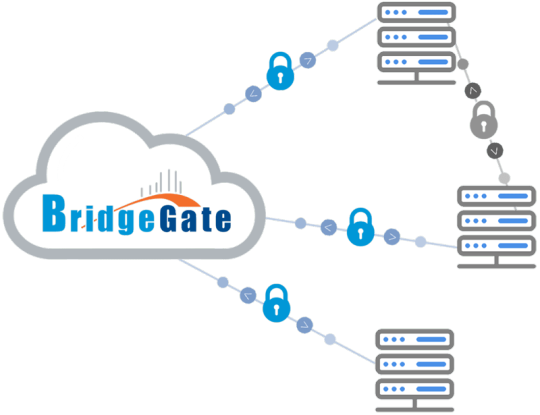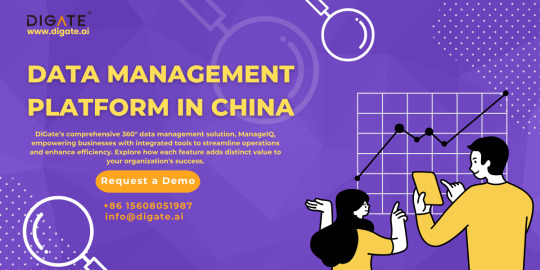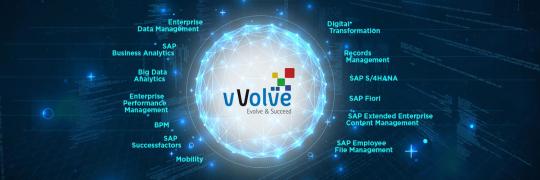#Data Management Solutions
Explore tagged Tumblr posts
Text
The iPaaS Empowerment and Some Essential Capabilities Fueling Success!
iPaaS (Integration Platform as a Service) has proved as a game-changer for businesses to grow & rule the current market with integration, accelerated workflows & enhanced data management solutions. It’s a cloud-based solution that helps in integrating software applications & streamlines operations. A professional iPaaS company can help you with enterprise-level solutions and offers a comprehensive approach that drives success for your organization. Many businesses, irrespective of their size & specification, are going to hire an iPaaS provider because it results more economical & beneficial for their businesses. But, before shifting it to a 3rd party service provider, there are certain factors that you must consider. In this blog, we have compressed some of the most crucial parameters that you must look into while connecting with an iPaaS provider.
Different considerable aspects while going for the iPaaS revolution

Optimized connectivity-
One of the prime qualities of an iPaaS company is to provide uninterrupted connectivity & effortless integration in the system. An iPaaS platform can create comprehensive compatibility & agility that not only connects the applications but also effortlessly integrates with legacy systems, cloud-based apps, APIs & IoT devices. This approach helps businesses a lot in unifying data from different sources, receiving proper data insights, taking data-driven decisions, and streamlining their operations.
Workflow automation-
iPaaS platform can help a business by creating complex workflows with ease through unparalleled workflow automation. It removes the need for human intervention and leads to fewer error occurrences, which are mainly human errors. It makes the process more fluent with a user-friendly interface & visually engaging appearances. Also, there are advanced triggers like real-time notification & supervision that result in optimizing the operations and eventually generating better results for the products & services.
AI-Powered insights-
In the age of data integration & data management solutions, AI has come up with a crucial role that helps in extracting valuable insights from the vast region of information. With advanced analytical tools & technologies, it helps in transforming raw data into actionable insights. This helps an organization identify opportunities & take data-driven decisions. Prescriptive analytics helps in creating customizable recommendations. Leveraging AI, iPaaS empowers companies to track performance, identify & monitor KPIs, and drive continuous improvement across all business functions.
Scalability-
The uninterrupted growth of a business highly relies on scalability & performance efficiency. An iPaaS platform provides advanced data management services by leveraging cloud-native architecture & trending data handling techniques. In this ever-increasing demand of the current business market, scaling capacities & performance assurance ensure the high-end success of a business. The iPaaS platform offers a quick response time & smooth data flow across the system by focusing on strategic implementations & breaking technological boundings effectively.
Data transformation & governance- iPaaS companies can help your business with effective data transformation & governance. To meet the standard regulatory aspects, functions like data encryption, strict data security & data governance are performed. iPaaS platform ensures that the right information is delivered in the right direction at the right time. From data mapping & transformation capabilities to data manipulation & governance, this platform can make it more seamless, holds customers' trust, and enables them to embrace the benefits of data-driven decisions.
Wrapping up
The above-mentioned parameters establish the credibility & expertise of a professional iPaaS company that can help businesses to optimize their digital transformation journey. Vorro’s BridgeGate Integration is an iPaaS that offers a collaborative solution approach to businesses across different industries and helps them to advance their ecosystem with trending technical interventions. As a responsible service provider, we use technology to provide scalable integration solutions by ensuring high-end security measures. If you are someone who is passionate about unlocking the enterprise's success of your business, embrace the power of iPaaS without compromising! We encourage you to welcome this digital revolution today to position your business at the forefront of the market tomorrow!
2 notes
·
View notes
Text
Data Management & Governance in Digital Transformation: Insights from Dr. Imad Syed Live Podcast | PiLog Group
In the thought-provoking live podcast, “Data Management & Governance in Digital Transformation | Dr. Imad Syed Live Podcast”, Dr. Imad Syed dives deep into the critical role of data governance in shaping business success and shares actionable strategies for organizations to effectively manage their data ecosystems.
Watch the Full Podcast Here:
Why Data Governance is Critical in Digital Transformation
Ensures Data Accuracy & Integrity: Reliable data is the foundation of informed decision-making.
Enhances Compliance: Meet regulatory standards and avoid costly fines with proper governance frameworks.
Strengthens Data Security: Prevent breaches and unauthorized access through robust governance strategies.
Improves Data Usability: Organized data ensures stakeholders can extract valuable insights effortlessly.
Supports Scalability: Well-structured data systems grow seamlessly with your business.
Key Highlights from the Podcast:
Understanding Data Governance Frameworks: Learn the essential components of effective governance models.
Overcoming Data Management Challenges: Address common obstacles like data silos, duplication, and inconsistency.
Best Practices for Digital Transformation: Discover proven strategies for integrating data management in digital initiatives.
Building a Data-Driven Culture: Foster a mindset where every team member values data accuracy and security.
Future Trends in Data Governance: Stay ahead with insights into emerging technologies and methodologies.
Gain Expert Insights Now: Watch the Podcast Here
Who Should Watch This Podcast?
C-Level Executives: Understand how strategic data management drives business success.
IT Professionals: Learn how to implement secure and efficient data governance frameworks.
Data Analysts: Extract meaningful insights from well-governed data structures.
Business Leaders: Align digital strategies with strong data governance policies.
Students & Educators: Gain valuable knowledge about real-world data governance applications.
Best Practices for Effective Data Governance in Digital Transformation
Establish Clear Governance Policies: Define data access, usage, and security protocols.
Invest in Advanced Tools: Leverage modern data governance platforms for efficiency.
Train Your Teams: Build awareness about data privacy and compliance across all departments.
Adopt Data-Driven Decision Making: Empower teams with reliable, real-time insights.
Measure & Refine: Regularly evaluate governance strategies and make necessary adjustments.
How Effective Data Management Powers Digital Transformation
Faster Innovation Cycles: Data-driven insights accelerate product development and deployment.
Stronger Customer Relationships: Personalized data-driven experiences improve customer satisfaction.
Operational Efficiency: Streamlined data processes reduce waste and optimize resources.
Enhanced Decision-Making: Reliable data fosters confident, informed decisions.
Scalable Business Growth: Strong governance supports sustainable expansion across industries.
Why You Should Watch This Podcast?
In this engaging live session, Dr. Imad Syed shares profound insights into how data governance and management are reshaping industries in the digital age. Whether you’re navigating digital transformation, enhancing your data systems, or setting up governance policies, this podcast offers actionable knowledge you can implement immediately.

Don’t Miss Out — Watch Now: Data Management & Governance in Digital Transformation | Dr. Imad Syed Live Podcast
Let us know your thoughts in the comments below. How is your organization leveraging data governance in its digital transformation journey?
#data management#data governance#digital transformation#drimadsyed#piloggroup#data scientist#big data#data analytics#datadriven#dataengineering#data#business intelligence#cloud computing#cybersecurity#data security#eric kimberling#data management services#data management solutions#data governance services#data governance solutions#pilog group podcast#dr. imad syed podcast#youtube
1 note
·
View note
Text
Effective Data Management Techniques for Better Decision-Making
0 notes
Text
Effective data management is vital for sustaining a future-ready business strategy. This post highlights five essential practices: centralizing data access, ensuring data quality, implementing security protocols, utilizing advanced analytics, and adopting scalable solutions. By mastering these practices, businesses can enhance decision-making, optimize operations, and better anticipate industry changes. Each practice is designed to strengthen data integrity and agility, helping organizations adapt and thrive in an evolving digital landscape.
0 notes
Text
What Are the Benefits of Using Cloud Solutions Software?

Virtualization of computing devices to facilitate mobility and collaboration helped global corporations embrace novel workflows. Besides, the world realized the true worth of investing in a secure cloud ecosystem in 2020. Software testing and cloud-hosted cybersecurity measures prove why this technology goes beyond the “learn from home” and the “work from home” revolutions. This post will explore the benefits of using cloud solutions software in business.
What is Cloud Solutions Software?
Cloud solutions software has all its core files, including code libraries, audiovisual media assets, and “work in progress” project data hosted on remote servers. These facilities enable a flexible and scalable computing experience utilizing cutting-edge data management solutions to run complex programs.
However, corporations relying on legacy IT infrastructure must cautiously migrate to cloud solutions software. Otherwise, they risk losing precious data necessary for analytics, regulatory disclosures, and periodic audits. Once a brand successfully integrates a trusted cloud computing platform, it can unlock unique productivity advantages across team collaboration and data governance.
What Are the Top Benefits of Using Cloud Solutions Software?
1| Secure Storage as a Service (STaaS)
A local business has fewer data management needs than a global organization would require. Yet, storing critical files on-premises increases data loss risks due to fire hazards, theft, hardware-level tinkering, and physical or liquid damages. Thankfully, Storage-as-a-service (STaaS) is a recognized use case of cloud solutions software that overcomes the drawbacks of local data repositories.
Why does STaaS matter to enterprise data governance? Every brand wants to process data ensuring comprehensive cybersecurity and consumer privacy compliance. After all, non-compliance can translate to financial penalties, trade restrictions, increased regulatory oversight, and executive officers receiving imprisonment.
Consider the personally identifiable information (PII) that custom chatbot development services might use for client experience personalization. These tools and their client companies can disclose their objectives in their privacy policies.
Still, customers expect both to uphold a reputable data safety and anti-phishing standard. Cloud-powered STaaS allows all firms to fulfill these essential cybersecurity obligations.
2| Real-Time Team Collaboration
Gone are the days when one report requiring five signatures would travel from one desk to another for a week or longer. With the advent of cloud platforms and hybrid workplace environments, industries witness a growing trend toward real-time collaboration.
Today, multiple team members can create, comment on, modify, and approve each other’s contributions to a project file without time loss. Cloud solutions software specializing in leadership and human resource management will also empower managers to track how each team member uses the company’s resources.
Professionals might work in distinct departments, branch offices, or independent agencies. Yet, reporting and idea exchanges will happen seamlessly, thanks to the collaboration-friendly features of cloud platforms.
3| Ease of Backups and Migration
When a company has stored business-critical intelligence in multiple devices, transferring it to a newer IT ecosystem or consolidating it will immediately become a disaster.
After all, data management professionals will have to overcome the following obstacles.
They must compare databases to distinguish between outdated records and the latest ones.
Data managers must mitigate technical compatibility risks. So, they will devise dedicated protocols to handle legacy file systems and discontinued reporting formats.
Simultaneously, their top priority is reducing operational downtime as much as possible during data migration. Otherwise, productivity and capacity utilization will dip, adversely affecting the net profit margin.
Likewise, creating digital backups of analog or semi-structured data objects like scanned PDFs of handwritten documents is a liability. It complicates storage and categorization tasks. Nevertheless, today’s cloud solutions software can assist business leaders in resolving these issues. They often include one-click options to import and export databases in universally adapted formats.
Conclusion
An on-premises data ecosystem has become redundant due to the birth of competitively priced cloud computing facilities. While specific business intelligence might seem safer in local systems, the increased sophistication of cybercriminals’ tactics suggests otherwise.
Remember, navigating this era where each stakeholder must work toward decreasing electronic waste demands an environmentally responsible data management mindset. And integrating cloud solutions software is the most useful method of combating corporate e-waste risks.
You have learned how this technology benefits enterprises. All that remains is to select a competent data management partner with a solid project portfolio.
0 notes
Text
As businesses grapple with increasing data volumes, "Data Management as a Service" (DMaaS) emerges as a crucial solution for effective data handling. This article explores the importance of DMaaS in modern data management, breaking down the different types, including cloud-based, on-premises, and hybrid options. Discover the many benefits DMaaS offers, from reduced overhead costs to enhanced data accuracy and compliance. This guide is perfect for organizations looking to streamline their data processes, safeguard sensitive information, and leverage their data for strategic decision-making.
0 notes
Text
Data Management Platform in China

Discover the power of data management platform in China with DiGate's comprehensive 360° ecommerce solutions. Elevate your business operations and efficiency with ManageIQ, an integrated platform offering tailored tools for seamless management. Explore how our innovative features optimize every aspect of your organization's workflow, ensuring unparalleled performance and success in the dynamic Chinese market.
#Data Management Platform in China#Data Management Platform#Data Management solutions#data management ManageIQ#e-commerce solutions#e commerce solutions#Chinese market
0 notes
Text

LEDGESURE IT CONSULTING PTE LTD - LedgeSure IT Consulting LedgeSure reinvents the IT consulting experience by offering cutting-edge technology and customized solutions. With LedgeSure technical expertise, customised solutions, integration solutions, and strategic tech partnership, we support clients in achieving their business objectives.
#Integration Solutions#Data Management Solutions#Data Analytics Services & Solutions#Cloud Transformation#Artificial Intelligence Solution
0 notes
Text
Unleashing Business Transformation with Smart Label Services
Explore how smart label services, featuring custom stickers with QR codes, data management solutions, product authentication systems, and labelling compliance software, revolutionize efficiency, security, and compliance for businesses. Unlock transformative potential across industries with real-time insights and seamless integration of physical and digital realms.
#smart label tracking#custom stickers with qr codes#Data Management Solutions#Product Authentication Systems
0 notes
Text
Choosing the Right Data Management Solution for Your Organization

In today's era, where data is often referred to as the "oil," it has become increasingly crucial for organizations to carefully choose the most suitable data management solution. With businesses generating amounts of data across industries, having a robust data management system that can efficiently capture, store, process, and analyze this information has become a top priority.
The right solution ensures effectiveness, enables informed decision-making, enhances customer experiences, and establishes a competitive advantage in the market. This article delves into factors organizations should consider when selecting a data management solution.
Understanding Your Data Requirements The initial step in finding the data management solution is comprehending your organization's specific data requirements. This involves evaluating the types of information your customer details, financial transactions, or operational metrics and assessing the volume, speed of acquisition, and variety of your data. Furthermore, it's crucial to consider how your data might expand and evolve. By grasping these aspects, you can choose a solution that meets your current needs while accommodating future demands.
Assessing Data Security and Compliance Data security and regulatory compliance are concerns for every organization. A reliable data management solution should prioritize security features to safeguard information from unauthorized access, breaches, and cyber threats. It should also comply with data protection regulations based on your industry and location, such as the General Data Protection Regulation (GDPR) or the Health Insurance Portability and Accountability Act (HIPAA). Ensuring your data management solution aligns with these regulations is crucial for maintaining customer trust and avoiding financial consequences.
Consider Integration Abilities In today's interconnected technology landscape, it's crucial for a data management solution to integrate with systems and software seamlessly. A solution that smoothly integrates with your IT infrastructure, including CRM, ERP, and analytics platforms, will streamline operations. Enhance data consistency across your organization. Integration abilities facilitate data sharing and analysis, allowing for insights and well-informed decision-making.
Evaluate. Adaptability
As businesses grow, their needs for data management evolve as well. A scalable data management solution can handle increasing amounts of data without compromising performance. Additionally, it's essential to assess the solution's adaptability—can it easily accommodate data types, sources, and technologies? Choosing a data management solution that can scale and adapt to advancements is crucial for supporting your organization's growth.
Evaluate. Return on Investment (ROI)
When considering data management solutions, it's crucial to analyze the initial investment and the long-term costs, including maintenance, upgrades, and training. Assessing the return on investment (ROI) is equally significant. Sometimes, a priced solution may offer features that bring substantial business value and result in a better ROI over time. Striking a balance between cost-effectiveness and meeting your organization's data management needs is vital.
Consult Experts and Request Demos
Before making a decision, it's advisable to seek advice from experts in data management. They can provide insights into the solutions available and how they align with your specific requirements. Additionally, requesting demos of the solutions you are considering allows for a hands-on evaluation of their user interface features and overall usability.
Selecting the data management solution is a strategic choice that impacts every aspect of your organization.
By considering your data requirements, ensuring security and compliance, considering integration capabilities, scalability, and cost factors, and consulting with experts, you can choose a solution that fulfills your immediate needs and sets your organization up for future achievements. In the changing world of data management, investing in a suitable solution is an investment in the long-term success of your organization.
#data management solutions#healthcare data management#automation in pharmacy#big data in healthcare#health data management
0 notes
Text
Data management solutions

Streamline your operations with Vvolve's expert data management solutions. Organize, secure, and harness the potential of your data to gain a competitive edge in today's dynamic market.
0 notes
Text
Top 5 Strategies for Data Aggregators to Ensure B2B Data Quality

Elevate your B2B data quality with expert insights. This essential read outlines five strategies for data aggregators, tackling common challenges in data management. Enhance your data's accuracy, consistency, and value, ensuring superior results in your analytics and customer engagements. Dive into the blog for transformative data solutions.
#data quality challenges#data aggregation techniques#data standardization#data management solutions#benefits of data quality
0 notes
Text

Streamline your business operations and unlock the full potential of your data with our Data Management Solutions in the USA. We offer end-to-end data management services, including data integration, cleansing, storage, governance, and analytics, tailored to meet the unique needs of your organization.
0 notes
Text
How Much Data is Required for Machine Learning?
Machine learning, a term Arthur Samuel coined in 1959, has entered every industry with promising problem-solving potential. Although it has revolutionized language and sentiment analytics, its effectiveness depends on the training dataset’s quality management. This post will elaborate on how much data is required for machine learning development.
What is Machine Learning?
Machine learning (ML) means a computing device can study previously-gathered historical sample data and learn about a concept like humans: through iterations or repetitive exposure. A well-trained ML model can perform more complex tasks. For example, ML helps automate data management services
It can convert user-generated content into multiple languages, enabling social media users to overcome language barriers. Simultaneously, machine learning can help business analysts, investors, and governments estimate macroeconomic trends through more robust predictive reporting.
Why Do You Require a Lot of Data for Machine Learning?
An ML model can generate output for practically-endless possibilities after processing vast databases. The ML algorithm will only be reliable if historical data used in a machine learning model is sufficient or free of data quality issues.
Likewise, ML models might handle semi-structured and unstructured data involving images, music, videos, or unique file formats. Especially in the case of market research, social listening, and big data, ML professionals require extensive data.
Otherwise, they will report impractical or skewed insights, wasting the client organization’s time and resources. Reputable data analytics solutions implement several safeguards to prevent these unwanted outcomes.
Besides, several ML-based software applications receive mixed reviews once they generate logically-absurd or controversial outputs. Therefore, you want to train the ML model as much as possible so that it will successfully respond to every user query.
How Much Data is Required for a Machine Learning Project?
Experienced ML developers recognize that a project’s data requirements depend on the scope, expected accuracy, and intended task complexity. Moreover, leveraging an exceptional data lifecycle management (DLM) approach will enhance dataset quality. So, a project will achieve better outcomes using less extensive training data.
For instance, training ML to do linear tasks having a few variations to respond to predictable changes in a workflow can require 1000 historical observations. The simpler the activity, the less data you will need.
Conversely, if you want an ML model to detect the language and expressed emotions in texts without human supervision, assume there is no limit to how many readings you will need to develop this model.
At least a million records are necessary to depict an individual feature in your ML model for advanced tasks. However, the following principles will help you estimate how much data you need for your machine learning use case.
Considerations When Calculating Data Required for an ML Project
Inference space influences how much data you need to arrive at a generally-valid conclusion from a much narrower data point collection. For example, describing the growth of bacteria in one pond will need less data. However, using similar observations to estimate how bacteria might grow in every pond worldwide will necessitate vast databases.
The signal-to-noise ratio has often helped sound engineers evaluate audio quality. And it appears in machine learning as the ratio between the contribution of relevant data “signal” and data’s obstructive or distracting properties. If the gathered data is 100% relevant to a use case, less data will be enough for ML operations. However, this idea is an ideal. In practice, always expect some noise to reduce the efficiency of ML model training.
The preliminary regression-led analysis will have low data demand. However, integrating an artificial neural network (ANN) implies you must invest more in big data adoption.
The law of large numbers, or LNN, builds the foundation of probability and statistics. According to LNN, the mean of a larger observation set is more accurate in every situation. If the available resources permit, include as many observations per ML feature as realistically viable.
Conclusion
Developing a machine learning algorithm and training the ML models requires financial and technological resources. Additionally, you want to hire domain experts knowing the nuances of big data, automated processes, and data quality management (DQM).
If misdirected efforts shape the ML implementation, an enterprise will likely lose more resources instead of sharpening its competitive edge via analytics. As such, managers must transparently interact with established ML and analytics providers to forecast the data requirements for an in-house machine learning project.
#Data Services#Data Solutions#Data Management Solutions#Data Management Services#Data Consulting Services
0 notes
Text
Why data quality management play an important role in today's business?
In this era of big data, cloud computing, and AI, data problems have grown beyond its volume or how it is used. If the data quality is compromised, advanced analytics loses its purpose. To ensure this doesn’t happen, enterprises will need end-to-end data quality management solutions
Get trustworthy data with a holistic AI-driven data quality management solution and accelerate business outcomes.
#cloud data management#data management platform#data management solutions#cloud data migration#Data Engineering Services
1 note
·
View note